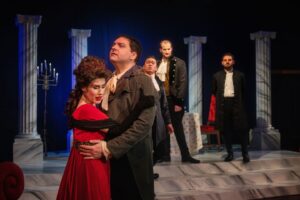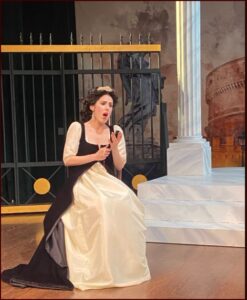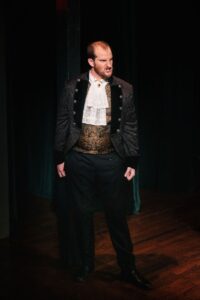Tosca
Giacomo Puccini
Original Italian Libretto by Luigi Illica & Giuseppe Giacosa
English Version by Donald Pippin
Pocket Opera, in a Co-Production with Cinnabar Theatre

When Giacomo Puccini’s universally popular, 1900-premiering Tosca is transformed from its usual position on grand opera stages with scores of cast members to an intimate setting where a few score of audience sitting on three sides watch action only a few feet from them, the storyline full of intrigue, romance, and great contrast of the heroic and the diabolical is more gripping than ever. In Pocket Opera’s current co-production with Cinnabar Theatre, the various, intimate venues of its three-weekend run along with Donald Pippin’s English version of the original Italian libretto allow us as audience to relish not only the familiar arias that soar and the glorious orchestration that awakens the soul, but also to experience close up the snarling growls of evil, the wrinkled eyebrows of fear, and the locked eyes of two people in love. With three key principals who not only bring expressive voices of note but abilities to act that any stage play would welcome, Pocket Opera’s Tosca is both memorable and moving.
The tightness of the timeline of Tosca – with all the action occurring in less than twenty-four hours – as well as the historical context of Napoleon’s June 17, 1800, approach toward Rome only enhance the stakes and the tension of the Luigi Illica and Giuseppe Giacosa’s original libretto. The storyline is brimming with torture, murder, and suicide as well as romantic flirting, jealousies, and fruition. The difference between life and death or between love gained and love lost centers time and again on decisions that must be made on incomplete information. The frailty of human existence in a time of national upheaval rings as true today as it did over two centuries ago in light of the invasions and conflicts currently disrupting thousands of lives around the globe – everyday people much like Puccini’s singer Floria Tosca, painter Mario Cavaradossi, or patriot prisoner Angelotti.
When the former counsel of Rome and now escaping political prisoner, Angelotti (well-intoned baritone Jordon Eldredge), arrives at a chapel to look for a disguise left by his sister, he is discovered by his friend, Cavaradossi, who is painting a Madonna whose face resembles Angelotti’s pious sister whom the painter has previously observed praying. Cavaradossi hides his friend from the pursuing authorities, sealing his own fate without knowing it as he sings, “My life itself, I’d forfeit to help you out.”
Soon to enter is the elegantly attired Tosca to catch a moment and maybe a kiss from her beloved artist. Upon hearing another voice as she arrives, she suspects Cavaradossi of unfaithfulness, especially when seeing the blue eyes of his Madonna are not those of hers, her being much darker. What follows is our first real chance to revel in the voices of Michelle Drever and Alex Boyer, soprano and tenor extraordinaire, respectively. Her dramatic bout of sudden rage and accusations vibrate with sustained notes trembling. His pleas of innocence and declarations that his true love is only for her soar in tenor clarity to powerful heights of emotion. Their final, mutual resolve of declared, true love is sung with their two voices intertwining as they embrace.

As Tosca, Michelle Drever will continue to thrill us not only with her distinctly arresting vocals but in this production, especially with her incredibly expressive, acting prowess. Her facial expressions – especially her lips and eyes – are a libretto unto themselves. A darkened glance in an opposite direction, a smirk as she feels the blade of a fateful knife, a capitulation of her entire body into the arms of her lover – in so many ways Michelle Drever captures the highly dramatic turns of events in these few, short, final hours of Tosca’s life. Along the way, a vibrant soprano that has a tendency to quiver and tremble when sustaining notes particularly works well in scenes when she is angry, fearful, and vengeful – emotions that Tosca has plenty of chances to express.
If there were to be one reason to rush to grab a ticket for the two remaining performances of this production, Alex Boyer is that reason. Time and again, his voice rolls through the waves of familiar arias Puccini awards the lead tenor, harvesting realms of nuance, emotion, and discovery in notes held long and clear. In his final aria, he remembers the scent of perfume and the feel of kisses of his Tosca, singing notes that throb as they beautifully project his fervorous affection. Rarely have I personally felt so many goosebumps as his Mario – facing a sure execution in only a few minutes – sings with such powerful, resounding voice just a few feet from where I sit of his love for Tosca and “a dream of love … gone forever.” Such is the power of opera, especially when one has the rare chance of opera up close.

The third of this set of principals is Puccini’s version of the devil incarnate, Baron Scarpia; and Spencer Dodd finds a myriad of ways to embody the evils of this villain. His deep-set, darkened eyes send glares that are frightening. His head tends to cock to the side each time he tells another lie or makes a threat. His frowns, looks of disdain, and lips that literally spit out the descending notes of baritone are all aspects of the viper Scarpia is. Spencer Dodd’s vocalizes the unctuous flattery that he pours on Tosca even as he physically is rough and cruel in his warped way of combining lovemaking and threats. While his baritone intonates Scarpia’s deceit and vileness, what is often missing is the power in volume needed to establish decisively his wicked disposition. For example, when Scarpia demands for a final time that Cavaradossi betray his friend Angelotti or face terrible torture, his “The judge is waiting for your disposition” is sung without the commanding, frightening power that is required to ensure sending chills down all our spines.
The high drama of the story works so well because Puccini keeps these three and their fates always in our primary focus; and that is particularly true in this Pocket Opera production where the total cast size is fourteen (along with a children’s chorus of five). Along with the impressive but short exposure to Jordan Eldredge’s vocals as Angelotti, particularly noteworthy is Eric Levintow’s striking tenor as Spoletta, using a voice that crisply and curtly pierces the air as he carries out the unholy commands of his master, Scarpia.
Mary Chun ably conducts the orchestra of twelve, rendering the rapturous score of Puccini with great skill. Particular kudos goes to the playing of James Pytko’s clarinet and Suzanne Chasalow’s French horn.
Wayne Hovey provides just the right amount of hints of scenes often designed for massive stages in the ways he has designed the sets for the opera’s three acts of a total of two-hour, thirty-minutes (with two intermissions). Donnie Frank’s period-defining designs dress each character distinctly, with special applause for the different attires of elegance with which Tosca is adorned (including flowing gowns, jeweled tierras, and elegant capes).
Most exceptional is the stage direction of Elly Lichenstein. Several touches have been added add spark to the story. Children playing like the little devils they are in a still-empty church is our opening image as the Overture is heard. Act Two’s opening underscores the of Scarpio as he seduces two young women who also seemingly have a good time lounging on a couch with each other. But the insightful and creative skills of the director truly come to life repeatedly in the ways the main three are blocked in their scenes alone and with each other. For example, the physicality of many scenes is palpable with the action so close to us as audience, with acts of violence so realistically staged (a shove to the ground, hands pressing a head to the point of clear torture, etc.).
And then there is the much-anticipated scene in every Tosca of the heroine’s final plunge. In this case, the fall over the parapet would mean a dive into the nearby orchestra; but together, director and actor solve the problem in a method just as tragic and final as one might see on stages many times larger. As the lights go down, we as audience have been afforded an enthralling Tosca in which the story’s drama and action takes a worthy bow along with the magnificent music.
Rating: 4 E
Tosca continues in production by Pocket Opera at 2 p.m. on July 23, 2023, at Hillside Club, Berkeley (2286 Cedar Street) and at 2 p.m. on July 30, 2023, at the Legion of Honor Museum, San Francisco (100 34th Street). Tickets are available at http://pocketopera.org .
Photo Credits: Courtesy of Cinnabar Theatre
